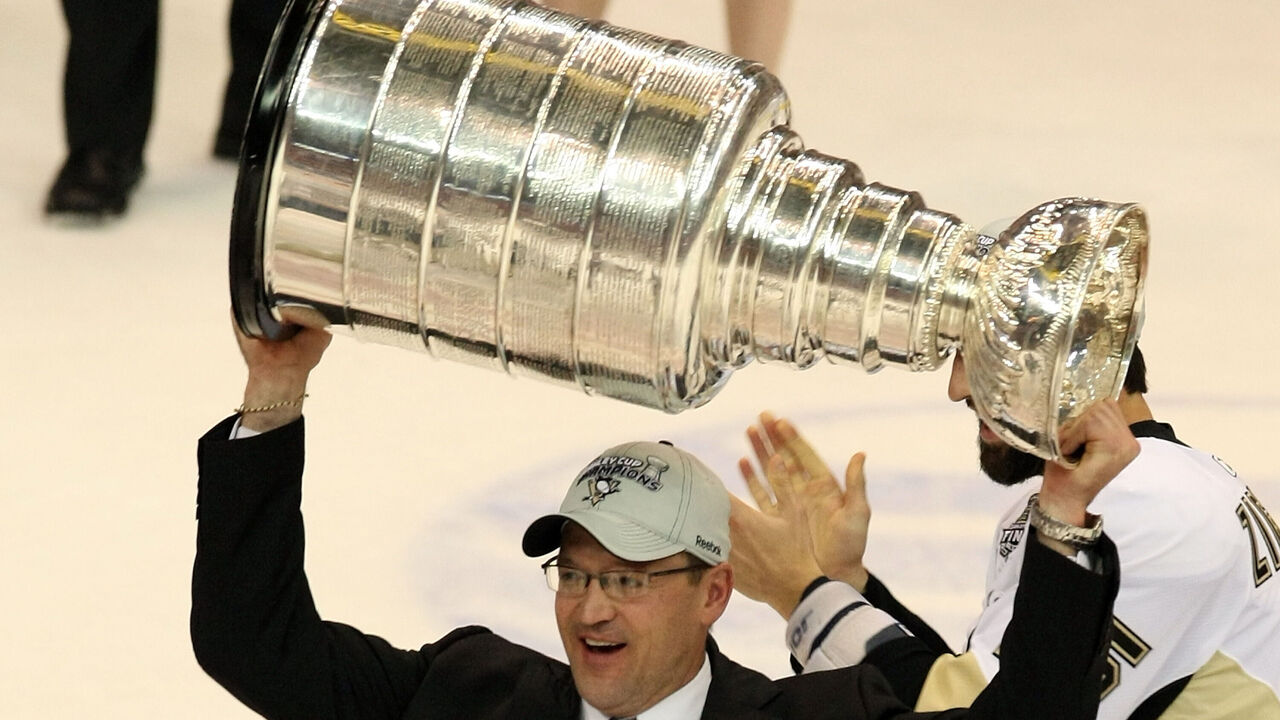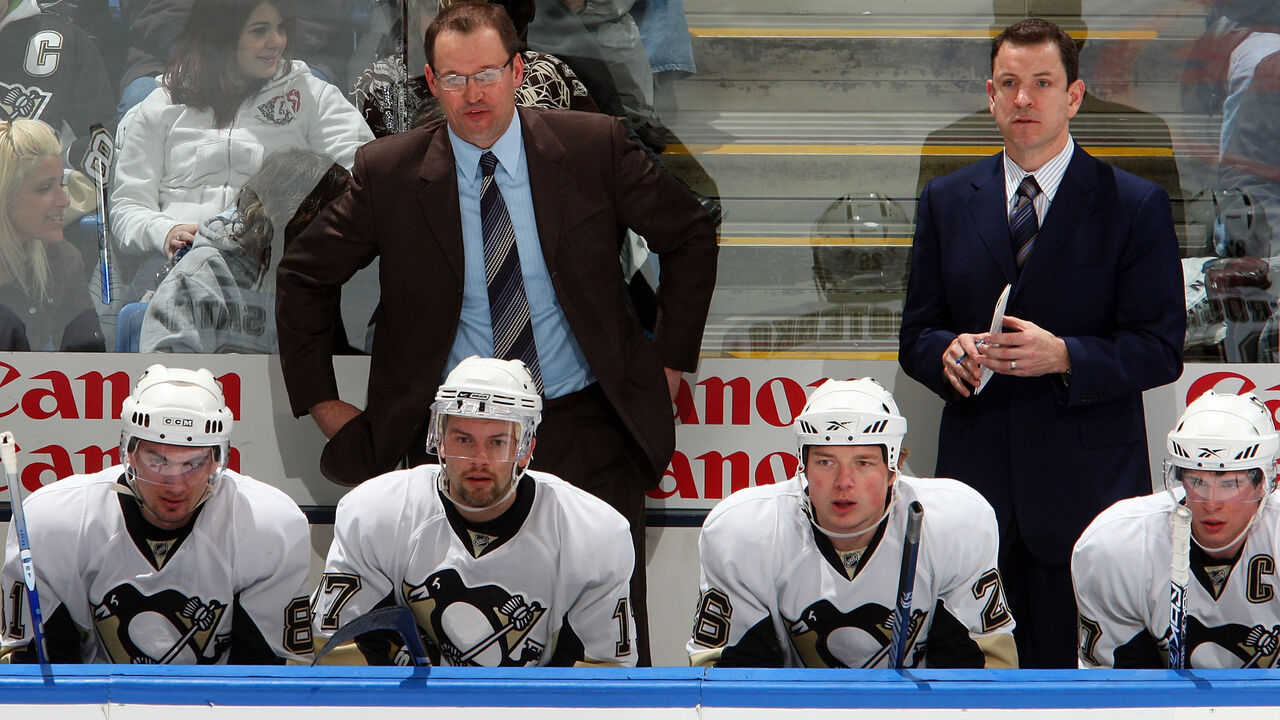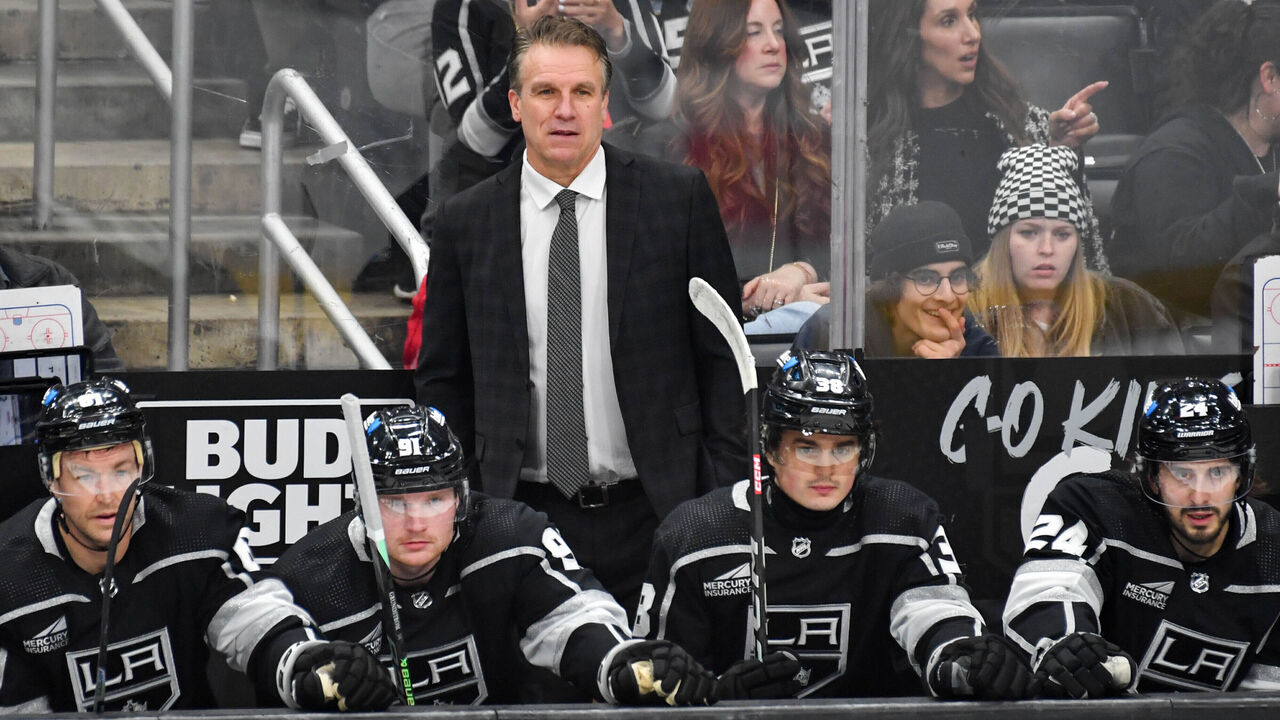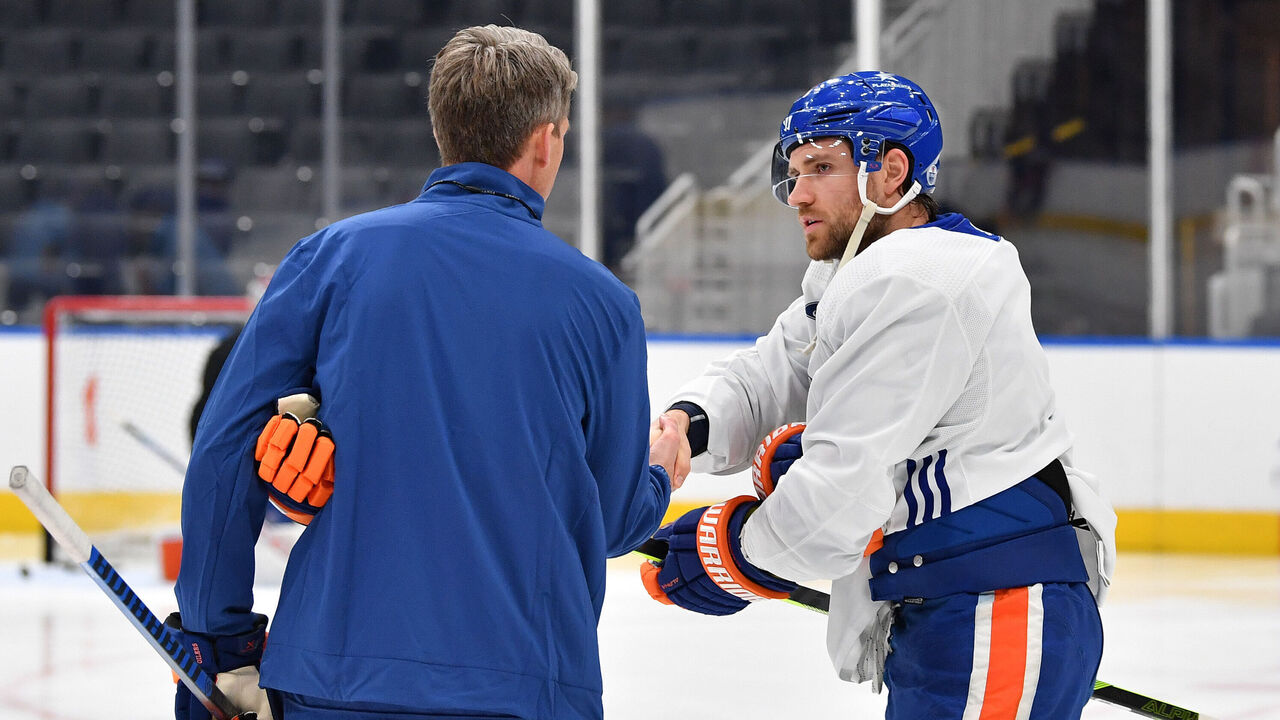It took Dan Bylsma only 49 games to accomplish what some coaches never get to do: lift the Stanley Cup. When Bylsma replaced Michel Therrien with 25 games left in the Pittsburgh Penguins' 2008-09 regular season, he was the youngest head coach in the league and a first-time NHL bench boss. But a Game 7 win over the Detroit Red Wings in the final capped the team's subsequent turnaround and put Bylsma in a rare club of rookie NHL coaches to win a Stanley Cup.
No one has joined those ranks since. Bylsma is also one of two rookie head coaches to win it all after being a midseason replacement. However, two coaches enter this postseason looking to join Bylsman in that select club. The Edmonton Oilers and Los Angeles Kings both turned to NHL coaching neophytes following disappointing starts to the campaign, and they'll face each other in the playoff's opening round starting Monday.
The Oilers finished 46-18-5 under Kris Knoblauch, who the club brought aboard after Jay Woodcroft started 3-9-1. This will be Edmonton's sixth postseason with the league's best player, Connor McDavid, leading the way. The Oilers are hoping Knoblauch has the secret to get them back to the final for the first time since 2006. On the other side, the Kings were 21-12-1 under Jim Hiller after dismissing Todd McLellan in February.
At 53 years old, Bylsma has 15 years of hindsight to reflect on the 2009 season. Following his successful debut, Byslma became the winningest coach in Penguins history and earned the Jack Adams Award in 2011. Currently the head coach of the AHL's Coachella Valley Firebirds, he led the Seattle Kraken's affiliate to Game 7 of the 2023 Calder Cup Finals, losing the championship in overtime. The Firebirds topped the AHL's Pacific Division in the 2023-24 regular season.
When Byslma looks back at that storied run with the Penguins in 2009, the first thing that comes to mind is how fleeting those days were. "In retrospect, it really was such a short period," he said.
But it didn't feel that way while he was going through it. "It's a lot of tension, and there's a lot of emotional roller-coaster rides.

"I was 38 at the time, and I hadn't been a head coach for very long at all," Bylsma said. His first shot at the top position was for the Penguins' AHL affiliate in Wilkes-Barre, working the initial 55 games for the club in the 2008-09 season. "From that standpoint, getting a team with Sidney Crosby, Evgeni Malkin, and getting them in a difficult position where they're out of the playoffs, it was a drinking-from-a-firehose experience."
What Bylsma remembers from those early days is both the privilege and pressure. The Penguins had a stunning amount of talent, boasting a roster that included Crosby and Malkin in their early 20s, future Hall of Fame goalie Marc-Andre Fleury, and defenseman Kris Letang, an eventual All-Star. The squad fell short in Game 6 of the Stanley Cup Final the previous year against the Red Wings.
"That was a team that maybe had not met expectations to that point," Bylsma said. "But it was a good team with good players, and you don't get that opportunity very often."
The replacements
The NHL favors re-hiring coaches with experience, but it's not uncommon for rookie bench bosses to get their shot when things are going wrong. "Many times, the opportunity to be a coach in the NHL is coming because the team's not in a great spot," Bylsma said. After starting the 2008-09 season 27-25-5 under Therrien, the Penguins sat 10th in the Eastern Conference. With 25 games left to salvage a playoff spot, general manager Ray Shero pivoted to Byslma on Feb. 16.
"When the coaching change was made, we were a long way out of the playoff picture," Bylsma said. "The expectation wasn't necessarily that we had a Stanley Cup team in the dressing room; it was that we were fighting to get into the playoffs to get a chance to do that."
Knowing someone just lost their job can alter a locker room. "Changing the coach hits the players in a unique way," Bylsma said. "I think they all feel some responsibility in the fact that they were the demise of the coach. I think that slap in the face is felt throughout the room, and - whether you call that a reset or not - it gives them some perspective about how they have to change as well.
"I think you get a response from the players because, to a man, they feel somewhat responsible for the situation the team is in with the coach. That's a reflective moment."

It's up to the new bench boss to do his part to capitalize on that energy change. "You're charged with guiding them and getting them into the playoffs," Bylsma said. "It was a difficult situation, but one I was prepared for."
In the Penguins' case, the results came quickly. "As I remember, we certainly started winning a lot of hockey games rather immediately," he said. The team finished 18-3-4 in Bylsma's 25 regular-season contests and lost only once in regulation in 13 matchups in March. Pittsburgh rose to fourth in the standings to set up a first-round matchup with the cross-state rival Philadelphia Flyers. The second round featured the first Crosby-Alex Ovechkin playoff meeting.
Beyond mindset, systems shifts are a midseason replacement coach's best tool. "You're always looking at what you would do differently without voicing that all the time," said Vegas Golden Knights coach Bruce Cassidy, who replaced Claude Julien on the Boston Bruins' bench in the 2016-17 season. He wasn't a rookie then but hadn't held an NHL head coaching job in 13 years and was looking for a second chance.
"I think when (I took over), there were some things in my head I thought we could do differently that might help the team, and that was just having our DNA a little more involved offensively," Cassidy said.
Those opportunities for coaches are so rare that the only thing Cassidy would change about that first year back as an NHL head coach is simple: "I think I would enjoy the moment a little more sometimes. I think when you're getting your second opportunity, you're so caught up in hockey that you always compartmentalize certain things."

The same could be said for rookie coaches in a similar position. Bylsma's 2009 Penguins were grinding from the day he arrived. "Sometimes they say your team needs to be playing its best hockey when it comes to the playoff time, but we were continually pushing and fighting and scratching and clawing to get into the playoffs, and that carried over," he said. "It carried over to the start of the playoffs and throughout our playoff run."
By the time it was over, the Penguins had secured hockey's top prize, and a 21-year-old Crosby became the youngest captain of a Stanley Cup-winning team.
History repeats itself
A modest parallel to Pittsburgh's situation could be brewing in Edmonton this postseason. Oilers general manager Ken Holland made his coaching change quickly rather than in the last third of the season, but Edmonton boasts a generational superstar and owns the league's best record since making the switch ahead of its 14th game.
Although Knoblauch has a relationship with McDavid as his junior coach in Erie, coming into a team with an established roster as a rookie coach can be challenging. "It's not easy," Oilers forward Zach Hyman said. "I think the key is just to be yourself."

Beyond that, any rookie coach looking to go far needs to mentally prepare to dig in for the long haul. "Over the course of my time in that year of '09, we rode a lot of ups and downs. The playoffs are long and arduous if you are going to win the Stanley Cup," Bylsma said.
He remembered a piece of advice given to him by Mario Lemieux in 2009 when the Penguins trailed the Capitals 0-2 in the Eastern Conference semifinal: "It's a long two months; stay with the process." Pittsburgh won the next three and earned a decisive 6-2 victory on the road in Game 7.
If Bylsma were to go back in time, that'd be the advice he'd repeat to himself. As short as it is in hindsight, it's long when you're living it - especially if you're lucky enough to go all the way.
"I had my head in my hands when he said that to me," Bylsma said. "It turned out to be prophetic. It was a long two and a half months, but I would tell myself to stay with the process, stay with the plan, and ride it out."
Jolene Latimer is a features writer for theScore
Copyright © 2024 Score Media Ventures Inc. All rights reserved. Certain content reproduced under license.